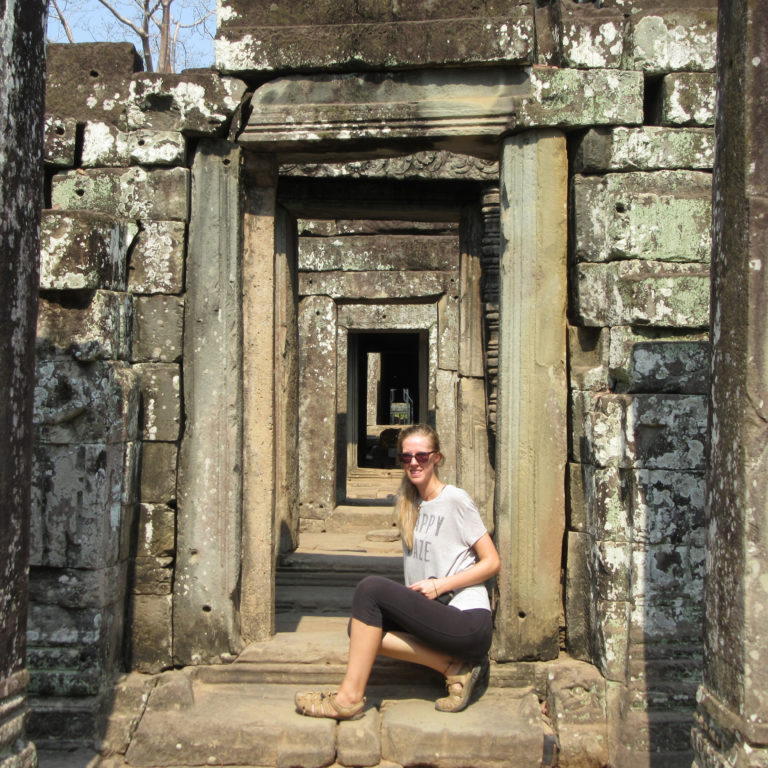From the iconic Angkor Wat proudly displayed on the Cambodian flag to the bustling streets where ox cart racing is a local tradition, Cambodia is full of surprises. Appropriately called the Kingdom of Wonder, the country’s scenic mountains, sun-soaked beaches and dense rainforests make it the perfect setting for a TEFL adventure.
Read more: Asia Uncovered: The Best Places For Teaching Jobs In Asia
Why teach in Cambodia?
Cambodia offers a unique opportunity for teachers to explore a developing country’s culture, providing a rustic and culturally rich immersive experience. The warmth of the people, low cost of living, respect for teachers and quirkiness of life in general make it an attractive TEFL destination.
There’s a school for every kind of teacher. Private institutions in Phnom Penh offer modern, well-equipped classrooms, making them an ideal choice. Locally-owned language schools are less equipped but still offer the chance to make a difference. Small-town experiences, where the impact of teachers is deeply felt and appreciated, can be both humbling and rewarding.
Work culture & classroom experience
Khmer refers to the ethnicity of the Cambodian people. Khmer schools follow the Cambodian National Curriculum and focus on the preservation of the local language and culture. In contrast, private institutions blend Khmer education with international elements.
Teaching experiences vary greatly depending on:
- the package you choose,
- location,
- type of school, and
- student demographics.
Many teachers in rural or underprivileged areas start out in volunteer positions. TEFL teachers in Cambodia often work independently rather than as assistants, so you can expect a full teaching load. You may teach across multiple age groups from 8 to 18 years old and manage your own lessons.
It’s important to be friendly and animated, particularly when dealing with Young Learners. Discipline is the responsibility of the Vietnamese teaching staff.
Read more: Differences Between Teaching Adults And Young Learners


Here, you’ll have to make do with the bare minimum and can expect a traditional approach to teaching, which often means relying on board markers and a whiteboard—or, in some cases, the old-school chalk and blackboard. Larger international schools have more structured and better-equipped learning environments.
Salary and cost of living
The package you choose can be a choice between a salaried position with no benefits or low pay with free housing. You can also work on a per-hour basis if you prefer. In general, Cambodia pays on the lower side as far as TEFL jobs go.
But if you ignore the numbers and focus on lifestyle, you’ll see that this isn’t a problem!
Luckily, the cost of living is low: 48.6% lower than in the United States for comparison! A TEFL teacher can expect to earn between US $700 to $1,200. This is enough to cover your expenses – plus you get to live in this fascinating country..
Lifestyle & cultural experiences
Nestled between Thailand, Laos and Vietnam, Cambodia’s location in Southeast Asia is perfect for travel enthusiasts.

The tropical climate means plenty of heat and humidity. Cambodians cope by napping for an hour or two every day, so don’t be alarmed if you find one of your colleagues lying in a hammock zoning out!
Teachers may live in basic accommodations in rural areas, sometimes with host families. Local food can take some getting used to, but once you are, you’ll be hooked! Noodles for breakfast? Delicious!
In a third-world country like Cambodia, you’ll be less dependent on devices and form meaningful social relationships with your colleagues, students, host families and local community. Time will slow down and you’ll have time to reflect and gain personal insights.
Possible challenges of teaching in Cambodia
- Cambodia is a third-world country with many social challenges, like corruption and crime. As inviting as the laid-back life may seem, it’s always a good idea to stay vigilant. Staying mindful of the social realities will ensure you stay safe and make the most of your experience abroad.
Read more: Top Tips For TEFL Teachers To Stay Safe Abroad
- Public schools often have large class sizes and use outdated teaching methods. This can lead to frustration. It’s up to you to adapt and keep things fresh.
- Navigating a new culture is always tricky. Being respectful of local customs will help build trust and rapport. For example, you can show respect by avoiding touching anyone’s head in Cambodia because it’s considered sacred. This is just one of many small actions you can take to avoid negative interactions.
If Cambodia catches your interest and you’d like guidance, training and support to help you along, an internship in Cambodia might be just what you need.You’ll gain invaluable practical teaching experience and a job by the end! Now that’s how you kickstart your TEFL adventure the right way!

















